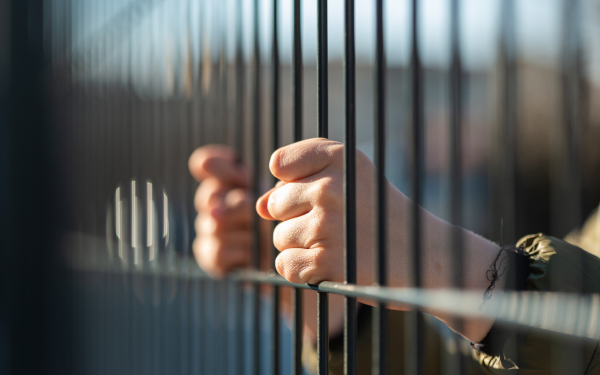
Social Work Recap is a weekly series where we present key news, events, conversations, tweets and campaigns around social work from the preceding week.
From the government’s controversial asylum bill becoming law and children being subjected to solitary confinement in a young offender institution to an update report on the Child Q case, here’s our week in social work:
Social work sector decries passage of ’small boats’ legislation
Picture posed by model (photo: pixelrain/Adobe Stock)
Social work bodies have decried the passage this week of the government’s flagship legislation to tackle small-boat crossings across the English Channel.
Once in force, the Illegal Migration Act 2023 will require the home secretary to detain asylum seekers deemed to have entered the UK illegally and then deport them to their country of origin or a safe third country.
While this duty will not apply in relation to unaccompanied children, they can still be detained under the act. The legislation also enshrines in law the practice of them being accommodated in Home Office hotels, a practice introduced in 2021 to deal with shortages of local authority placements.
In a joint statement alongside 289 other charities and campaign groups, the British Association for Social Workers said “this truly senseless act will have a devastating impact on people’s lives”.
The groups said it would “force people into situations that threaten their lives – whether by placing children in detention or sending people off to countries where their lives might be at grave risk”.
The Association of Directors of Children’s Services’ president, John Pearce, said the legislation ran counter to several key council duties under the Children Act 1989.
He warned it would also “create an incentive for children to run away before they turn 18 to avoid being returned to their home country, therefore placing them in danger of being exploited”.
Campaigning charity Social Workers Without Borders described the act as “morally repugnant” and “unworkable”. It has published a briefing to help social workers raise concerns over the law with their senior management teams.
However, the act’s full implementation is dependent on the government winning its ongoing legal dispute over its plan to deport asylum seekers to Rwanda, which is due to be heard by the Supreme Court.
Solitary confinement ‘normalised’ at YOI, find inspectors

Photo by AdobeStock/24K-Production
Solitary confinement has “become normalised” at Cookham Wood young offender institution (YOI), where 65% of children have been in care, the prisons inspectorate has said.
At an inspection in April, inspectors found that most of the 77 boys – aged 15-18 – were locked in their cells for 23.5 hours a day with “no meaningful human interaction”.
Others did not come out of their cell for days, with two boys locked away for more than 100 days for their protection.
The normalisation of confinement and isolation stifled any attempt “at meaningful and sustainable access to education, work or activity” for the boys.
Even when children could attend classes, the quality of the education was inadequate, with children allocated to vocational subjects on the basis of whom they mixed well with, not their needs and aspirations
Inspectors also found “a near total breakdown in behaviour management” at the YOI. A quarter of children reported feeling unsafe, up from 5% at the previous inspection, due to the widespread availability of weapons and the feeling that violence would arise if children mixed.
Chief inspector of prisons Charlie Taylor concluded: “There will need to be urgent, concerted, long-term commitment from leaders at the YOI and from the Youth Custody Service to improve standards at Cookham Wood and make it an acceptable establishment to hold children.”
UNISON and BASW urge increase to “out-of-date” mileage rates

UNISON and the British Association of Social Workers have urged the government to raise “out of date” mileage rates to stop public sector staff being left out of pocket due to rising fuel costs.
The current tax-free 45p-per-mile rate, set by HMRC, has not been updated since 2011, and is used by most councils and other public sector bodies to set mileage allowances for staff.
However, UNISON said the gap between fuel costs and mileage payments for staff who drove every day was over £6,000 a year, according to research it carried out with the RAC Foundation, published last week.
Some staff were using annual leave or calling in sick to avoid having to top up their fuel tanks for work. Others had had to sell their cars and shift to public transport, increasing travel time and limiting the number of visits they could make.
“Mileage rates are woefully out of date,” said UNISON general secretary Christina McAnea. “No one should pay a penalty effectively for doing their job, least of all those providing vital service.”
UNISON urged the government to increase mileage rates to 63.4p, which the RAC Foundation calculated was in line with the rise in motoring costs since 2011.
Meanwhile, BASW England and the Scottish Association of Social Work (SASW) backed a petition to raise the rate to 60p per mile, in a letter to chancellor Jeremy Hunt.
They said social workers and care staff were “currently absorb[ing] the impact of rising fuel costs, causing stress and worry when they’re trying to support people, often in difficult circumstances”.
Strip searches of children in London down 45% since Child Q case – report

Posed photo (model released): John Birdsall Social Issues Photo Library/Science Photo Library
Strip searches of children in London fell by 45% from 2021-22, in the wake of the Child Q case, a report has found.
Child Q, a black schoolgirl, was strip searched while on her period by Metropolitan Police officers at her school in 2020, with no appropriate adult present, after school staff reported her smelling of cannabis.
The decision to strip search Child Q was “insufficiently attuned to her best interests” and likely to have been influenced by racism, found a safeguarding practice review for City & Hackney Safeguarding Children Partnership (CHSCP), published in March 2022.
In a follow-up report, the review’s author, CHSCP’s independent child safeguarding commissioner, Jim Gamble, found that “progress has been made”.
Alongside the decline in the number of strip searches across London in 2021-22, no children in Hackney had been subjected to a strip search since March 2022.
However, the commissioner concluded there was still work to be done – especially in schools.
He recounted asking a group of black children if they had been searched in school, and every single hand went up.
The new report called for the CHSCP to carry out annual surveys of children on whether they felt safe and respected in school.
It also urged the Department for Education to amend its guidance on strip searching in schools “to better emphasise the very exceptional circumstances in which such action would ever be considered appropriate”.
You can watch Jim Gamble set out his findings here.
Instagram: take part in our giveaway!
View this post on Instagram



 Family help: one local authority’s experience of the model
Family help: one local authority’s experience of the model  ‘I spent the first three months listening’: how supportive leadership can transform children’s services
‘I spent the first three months listening’: how supportive leadership can transform children’s services  How senior leaders in one authority maintain a culture of excellence
How senior leaders in one authority maintain a culture of excellence  How staff support ensures fantastic outcomes for children and families
How staff support ensures fantastic outcomes for children and families  Workforce Insights – showcasing a selection of the sector’s top recruiters
Workforce Insights – showcasing a selection of the sector’s top recruiters 

 Facebook
Facebook X
X LinkedIn
LinkedIn Instagram
Instagram
Comments are closed.